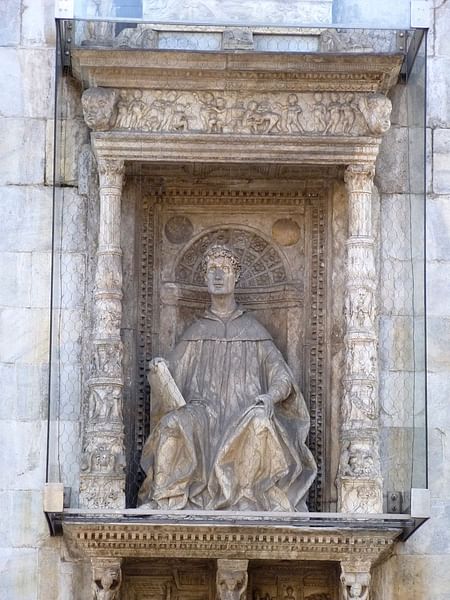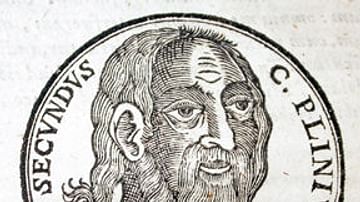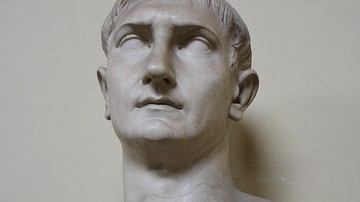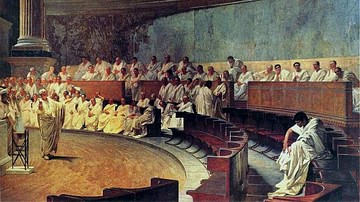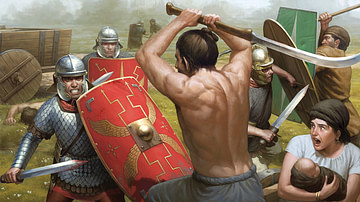Pliny the Younger's (61-112 CE) letter (Epistulae X.96) to Roman Emperor Trajan (r. 98-117 CE) is one of our earliest sources on Christianity from an outsider's point of view. It highlights the Christian movement's impact on the old Roman religion and provides the earliest historical evidence for Christian trials.
Pliny the Younger
Gaius Plinius Caecilius Secundus (61-112 CE), is known as Pliny the Younger to distinguish him from his famous uncle, Pliny the Elder (Gaius Plinius Secundus, 23-79 CE). Pliny the Elder was a naturalist who wrote Naturalis Historia (Natural History), the first encyclopedia. Pliny the Younger was raised and educated by his uncle, trained as a lawyer, and worked through the various levels of magistrates in the Roman Empire.
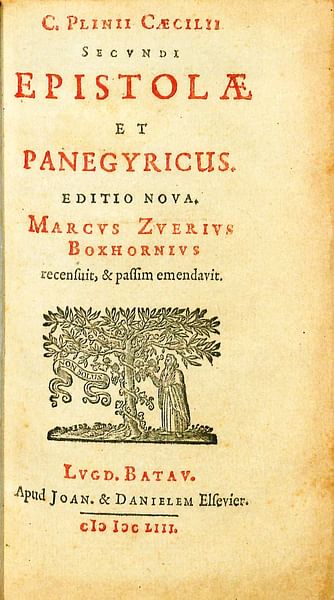
Pliny the Younger was an avid letter-writer, communicating with historians such as Tacitus (c. 56 - c. 118 CE) and particularly Emperor Trajan. We have 247 of his surviving letters which are historically valuable in the study of the governing of Roman provinces. In his public career of magistracies (known as cursus honorum, Latin for "ladder of offices"), he served as a prosecutor and defender in many cases against corrupt Roman governors. In two of his letters, he described his experience of the eruption of Mount Vesuvius (79 CE) when he was staying with his uncle. Pliny the Elder was the admiral of the Misenum fleet of the Roman navy at the time (in the Bay of Naples) and was prominent in his rescue of some of the citizens of the coastal towns. Pliny the Elder died on the beach from the volcanic gases and ash.
In 110 CE, the younger Pliny became the governor (legatus Augusti) of Bithynia, located south of the Black Sea. Considered a backwater province, Pliny began writing letters to Emperor Trajan for advice on handling his administration.
The Problem with the Christians
In 112 CE, Pliny wrote to Trajan on the problem of the Christians in the province (Epistulae X.96). He needed instructions because he had never presided over a "Christian trial" before. This letter is significant for the earliest historical evidence of such a thing as a Christian trial. Official persecution of Christians began during the reign of Domitian (r. 81-96 CE) in the 90s, for the crime of atheism, defined as disbelief in the traditional gods. Christians refused to participate in the state and imperial cults of Rome and provincial cities. The imperial cult, begun under Augustus (r. 27 BCE - 14 CE), honored the imperial family as benefactors under the special protection of the gods. Seen as a threat to the prosperity of the Roman Empire by angering the gods, non-participation was equivalent to treason, which carried a death penalty.
A second problem was that Christians were meeting in their own collegia without a permit that had been authorized by Rome. Collegia were groups that shared common interests or trade skills, similar to medieval guilds. Members always met under the egis of a god or goddess, which made them religious as well as social. Men paid dues, which paid for their once-a-month shared meals and wine. However, all collegia had to have permission to set up this establishment by the Roman Senate. In other words, they had to have a license. Near the end of the Roman Republic (1st century BCE), with so many civil wars, periodically the government would close all the collegia. It was assumed that men sitting around drinking all day when there was unemployment or other harsh conditions, would plot conspiracy against the Roman government. Christian collegia were illegal (and only granted legitimacy under Constantine I in the Edict of Milan in 313 CE). Christians were considered rebellious because they taught the imminence of the kingdom of God. There was only one legitimate kingdom, that of Rome.
Pliny to the Emperor Trajan
It is my practice, my lord, to refer to you all matters concerning which I am in doubt. For who can better give guidance to my hesitation or inform my ignorance? I have never participated in trials of Christians. I therefore do not know what offenses it is the practice to punish or investigate, and to what extent. And I have been not a little hesitant as to whether there should be any distinction on account of age or no difference between the very young and the more mature; whether pardon is to be granted for repentance, or, if a man has once been a Christian, it does him no good to have ceased to be one; whether the name itself, even without offenses, or only the offenses associated with the name are to be punished.
Meanwhile, in the case of those who were denounced to me as Christians, I have observed the following procedure: I interrogated these as to whether they were Christians; those who confessed I interrogated a second and a third time, threatening them with punishment; those who persisted I ordered executed. For I had no doubt that, whatever the nature of their creed, stubbornness and inflexible obstinacy surely deserve to be punished. There were others possessed of the same folly; but because they were Roman citizens, I signed an order for them to be transferred to Rome.
Soon accusations spread, as usually happens, because of the proceedings going on, and several incidents occurred. An anonymous document was published containing the names of many persons. Those who denied that they were or had been Christians, when they invoked the gods in words dictated by me, offered prayer with incense and wine to your image, which I had ordered to be brought for this purpose together with statues of the gods, and moreover cursed Christ—none of which those who are really Christians, it is said, can be forced to do—these I thought should be discharged. Others named by the informer declared that they were Christians, but then denied it, asserting that they had been but had ceased to be, some three years before, others many years, some as much as twenty-five years. They all worshipped your image and the statues of the gods, and cursed Christ.
They asserted, however, that the sum and substance of their fault or error had been that they were accustomed to meet on a fixed day before dawn and sing responsively a hymn to Christ as to a god, and to bind themselves by oath, not to some crime, but not to commit fraud, theft, or adultery, not falsify their trust, nor to refuse to return a trust when called upon to do so. When this was over, it was their custom to depart and to assemble again to partake of food—but ordinary and innocent food. Even this, they affirmed, they had ceased to do after my edict by which, in accordance with your instructions, I had forbidden political associations. Accordingly, I judged it all the more necessary to find out what the truth was by torturing two female slaves who were called deaconesses. But I discovered nothing else but depraved, excessive superstition.
I therefore postponed the investigation and hastened to consult you. For the matter seemed to me to warrant consulting you, especially because of the number involved. For many persons of every age, every rank, and also of both sexes are and will be endangered. For the contagion of this superstition has spread not only to the cities but also to the villages and farms. But it seems possible to check and cure it. It is certainly quite clear that the temples, which had been almost deserted, have begun to be frequented, that the established religious rites, long neglected, are being resumed, and that from everywhere sacrificial animals are coming, for which until now very few purchasers could be found. Hence it is easy to imagine what a multitude of people can be reformed if an opportunity for repentance is afforded. (Epistulae X.96)
Under Roman law, slave testimony could only be obtained through torture. This is evidence that the earliest Christian communities had elevated both slaves and women in leadership roles.
Trajan to Pliny
We are fortunate in having Trajan’s response:
You observed proper procedure, my dear Pliny, in sifting the cases of those who had been denounced to you as Christians. For it is not possible to lay down any general rule to serve as a kind of fixed standard. They are not to be sought out; if they are denounced and proved guilty, they are to be punished, with this reservation, that whoever denies that he is a Christian and really proves it—that is, by worshiping our gods—even though he was under suspicion in the past, shall obtain pardon through repentance. But anonymously posted accusations ought to have no place in any prosecution. For this is both a dangerous kind of precedent and out of keeping with the spirit of our age. (Epistulae X.97)
The Importance of Pliny’s Letter
Our earliest Christian literature in the 1st century CE comes from the letters of Paul the Apostle and the gospels. However, Pliny’s letter is significant as one of the earliest descriptions of the Christian movement from an outsider’s viewpoint. His mention of the movement spreading from the cities "to the villages and farms" helps to confirm the spread of early Christianity throughout the Roman Empire. Pliny’s description of the neglect of the temples coheres with the impact that Christian teaching had on traditional concepts and rituals of Roman religion. Ultimately, it was accepted after Constantine’s conversion to Christianity, and in 381 CE, it became the only permitted religion in the empire under Theodosius I (r. 379-395 CE).
